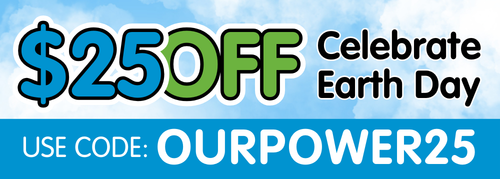When You’ve Dealt Life Lemons, Make Lemonade Instead
By: Christine McLean, Eco Promotional Products, Inc.
Climate change is no longer a distant fear. It is happening now. Crazy, unpredictable, mind-baffling are a few of the words that come to mind. In some areas rain comes unpredictably in heavier downpours, while other regions experience extended drought. Snow in Texas, more hurricanes and tornados, all-in-all its become “EXTREME”. With these changes we have seen our sea-levels rise, increased flooding, reduced agricultural crop yields, destroyed forests, and diminished water resources. So what do we do when life throws us this curveball of change? We make the best out of a bad situation. The actions that have already been put into motion to help prevent climate change will still make a difference over our lifetime, especially if we continue to adapt and aggressively continue to push for change.

An example of a positive policy in motion has been implemented by Bill Finch, mayor of Bridgeport, Connecticut. He received approval to put 9,000 solar panels over an old landfill which will power more than 5,000 homes with a zero-emissions energy source. They created a plan called “BGreen2020” that outlines over sixty ways to create green jobs, reduce emissions, and improve residents’ quality of life. No question, all of this came to fruition to help fight climate change and to undo the past mistakes done to he Earth.
AmeriCorps members prove to be additional examples of positive policies. They have improved more than 1 million acres of parks, built or maintained 14,300 miles or trails or rivers, weatherized 2,100 homes, taught 196,000 people energy efficiency, and recycled 880 tons of materials, all in 2012. Of course, there are thousands of cities, foundations, groups and individuals that have made a difference towards making our Earth a better place every day. But adopting and implementing new energy and environmental policies acknowledging the current stage of our environment is just the beginning. What good can come from the past? How do we continue to make a change for the future towards climate change?
1. Recycle Paper! About 37% of fiber used to make new paper products in the US came from recycled sources in 2011. So while we have already used a lot of paper, we can recycle it into things like paper towels and writing paper. Even cooler, we can recycle paper into masking tape, paper money, coffee filters, car insulation, egg cartons and so much more! Check out these recycled paper products offered by Eco Promotional Products (EPP). Click on each item to learn more:
Recycled Business Card Holder
USA Made Recycled Luggage Tag with Die-Cut Window
2. Glass can also be recycled. In fact, glass bottles and jars are 100% recyclable and can be recycled endlessly. Over a ton of natural resources are saved for every ton of glass recycled. Check out these recycled glass ideas presented by Eco Promotional Products:
USA Made 100% Recycled Glass & Wood Nameplate
Recycled Glass Wine Punt Glass
3. While EPP doesn’t encourage the use of single use plastic bottles, if you must use them make sure they make their way into a recycling bin! In 2012, only 9% of the total plastic waste generated was recovered for recycling. Yet plastic can be recycled into so many things including reusable water bottles, fiber for carpets and textiles, and clothing such as t-shirts and fleece jackets. The ban on plastic bags in California has created new jobs as the demand for reusable bags has climbed. We have several items made from recycled plastic including bags:
Recycled Fold-Away Sling PET (recycled from water bottles) Bag
21 oz. Eco Sports Bottle
4. The forests in Colorado have been plagued by beetles. One species alone has killed more than 70,000 square miles’ of trees with its damaging infestation. However, recycled wood collected from the floor of these forests can still be used for many things. Presented are just a few recycled wood items made from devastated forests:
USA made Beetle Kill Pine Award
USA made beetle pine recycled name badge
By recycling and using recycled and reusable materials you prevent pollution caused by the need to harvest raw materials. You help save energy and reduce greenhouse gas emissions. And you help reduce the amount of waste that will be sent to landfills. If you are looking for other ways to make a difference, check out EPA’s website: http://www.epa.gov/climatechange/wycd/
Sources: www.epa.gov, www.huffingtonpost.com, www.gpi.org



